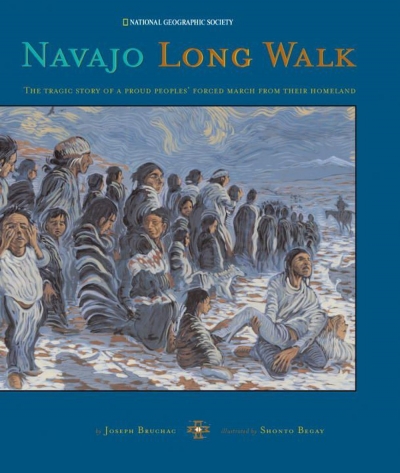In 1863 General James Carleton, military commander of the U.S. territory of New Mexico issued an order that all Navajos were to be rounded up and forced to live on a reservation that was some 400 miles from their homeland. He, like most white people at the time, thought that the Navajos were lawless raiders who needed to be "weaned of their old ways." He felt it was his job to "kill the Indian" and "save the man." If Carleton had taken time to find out about the Navajo people, he would have learned that their raids were in retaliation for raids by others on them. Most Navajos wanted peace, but every treaty they signed cost them land and was quickly broken. Kit Carson was put in charge of carrying out Carleton's orders. As the Navajos watched the soldiers destroy their crops, they soon realized that to survive they would have to surrender. More than 8,000 Navajos were rounded up and forced to march to the infamous Bosque Redondo. Hundreds died of dysentery from eating white people's food, others died of exposure, and those who were too weak or too sick to keep up were shot along the way by soldiers. Life at Bosque Redondo was inhumane. The Indians lived in holes in the ground covered by whatever they could find. The ground was too dry and poor to grow corn, and they had little in the way of clothing. Eventually even General Carleton realized that the reservation could not take care of all the Indians living there, and he ordered the march stopped. When word of the horrid conditions at the Bosque reached Washington, Congress organized an investigation. General Carleton was removed, and the Navajos signed the first fair peace treaty with the U.S. government. Not only were they allowed to return to their homeland, but they were given food, supplies to rebuild their homes, and livestock to raise. The Navajo hozho - harmony - was restored, and they prospered. Today more than 150,000 Navajos live on the largest reservation in the country. They have never broken their promise to live in peace with the United States and have even served proudly in the military that at one time had caused them such pain.

